Online porn: Can schools keep pupils safe and innocent?
- Published
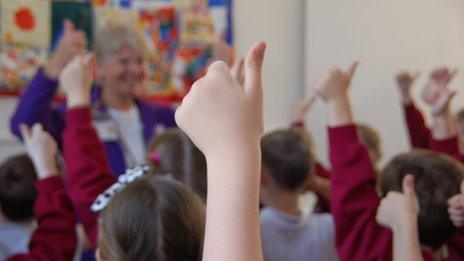
Thumbs up! Primary school children give their views during a Growing up Safe session in Lincolnshire
Concerns about children's exposure to graphic sexual images online have led to calls for primary pupils to hear about the dangers of pornography. So how should schools broach the subject and what is the right age to start?
At Castledyke Primary in Barton, North Lincolnshire, head teacher Rosie Pugh has adopted a robust approach to building children's resilience to any explicit material they may see online and is in no doubt that it needs to start early.
"Eye-popping"
She fears there are children vulnerable to abuse among her pupils and describes some of the stories she has heard from families as "eye-popping".
Her views echo fears voiced by Ofsted earlier this year in a report, external which found that a lack of quality age appropriate sex and relationships education in more than a third of schools risks leaving children vulnerable to inappropriate sexual behaviours and sexual exploitation.
The BBC sat in on a session for seven- to nine-year-olds at Castledyke run by Lynnette Smith, who teaches sex education and trains teachers in the subject in North Lincolnshire and East Yorkshire.
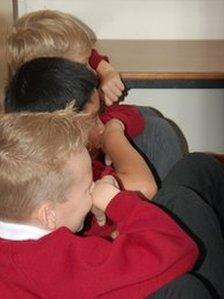
Giggling in the corner - some words are hard to say
Her approach is cheerful, direct and accompanied by hand-drawn illustrations that look as if they might have been done by an off-duty artist from The Beano.
Each picture presents a scenario to which the children are asked to give a thumbs up or thumbs down.
Lynnette uses the same set of cards for presentations from four-year-olds in their first year of the infants, to 10 and 11-year-olds about to leave for secondary school.
The children find it hilarious. There are gales of laughter, coupled with appalled cries of disgust, but the half-hour sessions, which involve the whole class of up to 30 children, their teacher and a learning assistant, tackle some serious issues.
Classes like this may not be suitable for all primaries cautions Russell Hobby, general secretary of the National Association of Head Teachers (NAHT): "Innocence is precious. You don't want to start too young."
"My bottom line is to ask, 'From what age are they vulnerable?'" says Ms Smith.
'Scientific' names
"Our first card is a girl with no clothes on. She looks as if she is ready for the bath. Well I hope she is not going to school".
Lynnette asks the children to list the body parts that they should not let people touch.
"Your widger and your lucy," is the response. She encourages the class to use "scientific" names instead of colloquialisms.
The class chorus words like genitals, penis and vagina.
There is a point to this. Knowledge and understanding can help keep a child safe, says Lynnette.
"Paedophiles will avoid an educated child."
The cards tackle different forms of good and bad touching. A kiss with a smile, a boy giving another boy a flower. A thumbs up to all of this.
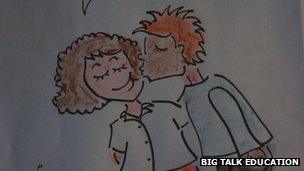
Then, grabbing a woman's breasts, looking under toilet doors when someone is inside, pulling at a boy's underwear. Thumbs down to this, declare the class.
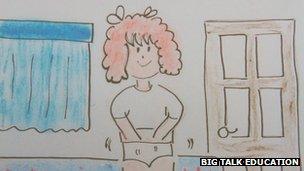
The cards tackle subtleties like where it is OK to urinate, expose your genitals or underwear or indeed to "have a little rummage in your underwear" - not outside, in broad daylight, but somewhere private like the bathroom.
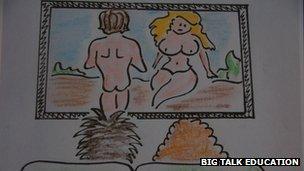
What sort of photographs are OK? Smiling at the camera with all your clothes on gets a thumbs up. Showing your bottom to the camera, a thumbs down.
"He could put it on the internet!" says a boy.
"It's a private part of the body. Nobody should ever take pictures of the private parts of your body except perhaps if you get injured and have to go to hospital," explains Lynnette.
'Tell someone'
The next card depicts an older boy apparently showing a younger child an unsuitable image he has downloaded on to a smartphone.
"Wrong, wrong, wrong", yells one boy.
"No-one should make you watch something like that. You must tell someone," says Lynnette.
Each child is asked to think of someone at home and someone at school they would tell.
The picture after that is the view from behind a sofa where two adults are watching a porn film.
"There are films where the actors have no clothes on or are hurting each other that some grown-ups want to look at but it's not meant for children," says Lynette.
"If this is grown-ups watching and you are not there then that's fine but not if it's your babysitter or older children."
There are hints that some members of the class are already aware of this sort of film: "My brother looks at pictures like this. He's 20," one child says.
When Lynette asks if the child is forced to look at the pictures, he says no. Lynnette says the attitude of most children and young people is the same as it ever was.
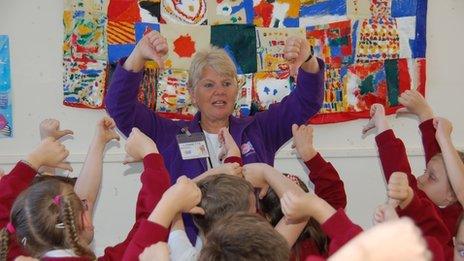
Lynnette Smith says it is vital for parents to feel confident to answer children's questions about sex
"Most are the same naive little kids who just want to know more about their bodies and are totally appalled and repelled by the idea of sex.
"There are still a lot like that even at 14.
"But because I have been in sex education since the mid-90s, I have seen how it's progressing. In 2002 everyone got the internet and much younger children began to see pornography.
"Ten- and 11-year-olds are often keen to tell you what they have seen."
Sometimes, she says, this kind of exposure can lead to sexually inappropriate behaviour and make children vulnerable to sexual exploitation.
At the very least, children are asking questions about sexual issues at a much earlier age, particularly if they have seen something online or in the media that they do not understand.
Sex and relationship education, she argues, is in urgent need of updating as the current guidelines do not mention issues such as sexting (the sending of sexually explicit material via a mobile phone) or pornography.
In her presentation to parents before the sessions with children, she explains how vital it is to talk to children about these issues in the early years of primary school.
Ideally the parents should feel confident to answer their child's questions.
"If you're not sure of an answer, research it, maybe together in a book," she advises.
'Horrified'
"Don't ever say, 'Ask me when you're older,' because that's like saying, 'Go and Google it.'
"If they know that they can talk to you now they will keeping coming back to you for information into their teenage years.
"Most parents get it about right until children are about five and then they get the jitters."
Some of the mothers said they had been horrified when they first read the school's letter about Lynette's visit but were reassured by her explanations.
"I thought, no they're only seven. My husband said thank heavens he was away," said one.
"It was never like this when I was at school. You find sex on television even at seven in the evening. I don't know how to address it really but you have to talk about it," said another.
Ofsted's report said some schools left children vulnerable to abuse because they did not teach them appropriate language or develop the confidence to describe unwanted behaviours.
It also said sex education in some primary pupils left pupils "ill-prepared" for puberty.
The NAHT has called for "conversations" about online dangers to start early in primary school but Mr Hobby says these should be "general warnings that they may see things they don't like online and advice on what to do about it when they do".
With schools needing to walk a line between protecting children from harm and maintaining their innocence, Mr Hobby says: "It needs a decision for each primary school in full consultation with parents."
For Castledyke's head teacher, encouraging parents and teachers to talk about the issue with children is key to helping protect youngsters in vulnerable families from becoming victims of abuse.
"I am always really surprised about how coy some adults are, but once it's in the open it's quite simple. You just need to speak to children openly, honestly and confidently", says Ms Pugh.
"We've got to stop it happening to another generation."
- Published20 September 2013
- Published5 September 2013
- Published20 May 2013
- Published26 April 2013
- Published18 April 2013
- Published26 March 2013
- Published5 February 2013
- Published22 January 2013
- Published21 November 2011